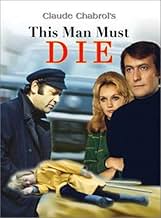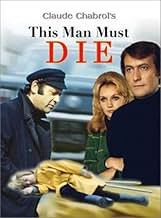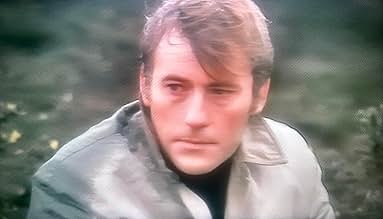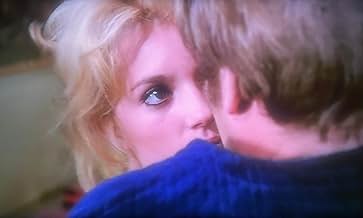IMDb रेटिंग
7.6/10
5.1 हज़ार
आपकी रेटिंग
अपनी भाषा में प्लॉट जोड़ेंA man asserts himself within the life of an actress he believes is somehow responsible for his son's death.A man asserts himself within the life of an actress he believes is somehow responsible for his son's death.A man asserts himself within the life of an actress he believes is somehow responsible for his son's death.
- निर्देशक
- लेखक
- स्टार
- पुरस्कार
- कुल 1 जीत
फ़ीचर्ड समीक्षाएं
A car runs over the boy Michel Thenier while he is crossing the street in his calm village in Bretane, and the hit and run driver flees without any witness. His grieving father Charles Thenier (Michel Duchaussoy) becomes obsessed to find the reckless driver that murdered his only son to kill him and spends his time writing his diary and running his own investigation in garages and junkyards. One day, he learns by chance that the actress Helene Lanson (Caroline Cellier) might be the responsible for the death of Michel. Charles travels to Paris posing as screenplay writer, introduces himself using his pseudonym of Marc Andrieux and seduces Helene with the intention of killing her. However, Helene tells that her family is from Brittany and her brother-in-law Paul Decourt (Jean Yanne) owns a garage in Quimper. When Helene invites Charles to travel to her sister's house to know her family, Charles finds that Paul is a despicable man with a disease in the intestine, hated by his family and his own son Phillippe Decourt (Marc Di Napoli) wants to kill him.
"Que la Bête Meure" a.k.a. "This Man Must Die" is an ambiguous story of hatred and revenge with an open conclusion where it is not clear who really killed the detestable Paul Decourt. The odyssey of Charles to find the killer proves that he is a manipulative and Machiavellian man; therefore, it is impossible to conclude what is his final destination. One point that intrigues me and maybe a clue to the truth is when Paul calls Marc by Charles, when they are preparing to sail. Neither Claude Chabrol nor Charles Thenier would be capable to committing such mistake and then in the boat Charles tells to Paul that the entertaining is just beginning. This sequence corroborates with the deduction of the detective and associated to the profile of Charles that should be incapable to neglect his journal may indicate that Phillippe is really innocent, but I cannot assure that my interpretation is correct. My vote is eight.
Title (Brazil): "A Besta Deve Morrer" ("The Beast Must Die")
Note: On 04 December 2024, I saw this film again.
"Que la Bête Meure" a.k.a. "This Man Must Die" is an ambiguous story of hatred and revenge with an open conclusion where it is not clear who really killed the detestable Paul Decourt. The odyssey of Charles to find the killer proves that he is a manipulative and Machiavellian man; therefore, it is impossible to conclude what is his final destination. One point that intrigues me and maybe a clue to the truth is when Paul calls Marc by Charles, when they are preparing to sail. Neither Claude Chabrol nor Charles Thenier would be capable to committing such mistake and then in the boat Charles tells to Paul that the entertaining is just beginning. This sequence corroborates with the deduction of the detective and associated to the profile of Charles that should be incapable to neglect his journal may indicate that Phillippe is really innocent, but I cannot assure that my interpretation is correct. My vote is eight.
Title (Brazil): "A Besta Deve Morrer" ("The Beast Must Die")
Note: On 04 December 2024, I saw this film again.
Claude Chabrol made a lot of films during his career, and while I've only really scratched the surface so far - I have to say that this one is right up there with his very best! Chabrol's films aren't thrillers in the same vein as those made by the likes of Alfred Hitchcock (in spite of the fact that he is often known as 'The French Hitchcock'); with Chabrol the thrills don't come from moments of suspense or tension, but from the interest generated in the lead characters and the situation put forward, and that was never truer than with this film - perhaps the most sombre revenge movie ever made! The film starts off with a young boy returning home from the beach. However, his stroll is interrupted when a car comes out of nowhere and runs him down. The boy's father, a man named Charles Thenier, is distraught following the accident and vows to track down the man who did it. His thirst for revenge is great, but his hatred towards the murderer is so immense that he decides, one he finds him, to befriend and lure him into a false sense of security before killing him...
Since there's not a great deal of excitement in the visceral sense, it may seem on the surface that This Man Must Die does not do its job as a thriller. However, this couldn't be further from the truth. Chabrol's film is brooding and intriguing throughout and has a great sense of realism in the way that the wronged father goes after the man who killed his son. It has to be said that the film somewhat hinges on coincidence, but this is actually addressed within the film itself and the events that take place are largely logical. Once again, Chabrol's production values are high and the film is incredibly beautiful and it bodes well with the sober tone of the movie. The acting is fantastic, with Michel Duchaussoy doing well in the lead role and receiving excellent feedback from the lovely Caroline Cellier and the brilliant Jean Yanne who steals every scene he's in as the villain of the piece. The film boils down to an excellent conclusion that both comes as something of a surprise and adds some Greek tragedy into the mix. Overall, this is another big success for the great French director and comes highly recommended!
Since there's not a great deal of excitement in the visceral sense, it may seem on the surface that This Man Must Die does not do its job as a thriller. However, this couldn't be further from the truth. Chabrol's film is brooding and intriguing throughout and has a great sense of realism in the way that the wronged father goes after the man who killed his son. It has to be said that the film somewhat hinges on coincidence, but this is actually addressed within the film itself and the events that take place are largely logical. Once again, Chabrol's production values are high and the film is incredibly beautiful and it bodes well with the sober tone of the movie. The acting is fantastic, with Michel Duchaussoy doing well in the lead role and receiving excellent feedback from the lovely Caroline Cellier and the brilliant Jean Yanne who steals every scene he's in as the villain of the piece. The film boils down to an excellent conclusion that both comes as something of a surprise and adds some Greek tragedy into the mix. Overall, this is another big success for the great French director and comes highly recommended!
With 'Que la bete meure' (The English title is 'This Man Must Die' and is inspired by a novel by Cecil Day-Lewis, yes, the father of ... ) Claude Chabrol ends the decade of his consecration as one of the most talented and prolific French film directors of the second half of the 20th century. He had started the 60s as a New Wave theorist and one of the most daring directors of this current and he ends it as a well-known director and one who is very close if not part of the mainstream. Along the way, he made 15 feature films, most of them thrillers, almost all inspired in one way or another by Alfred Hitchcock's films. The master of suspense was not only an idol for the directors of the French New Wave, but he also watched them with interest and he dialogued with them, literally and even artistically. For Chabrol, 'Que la bete meure' marks not only the end of an excellent decade of film directing, but also represents one of his best and most original films.
Most of the story takes place on the Breton shores of the ocean, in the villages and especially on the roads near the cliffs. The film begins with the traumatic intersection of two destinies - a child who returns from picking shells on the ocean shore is killed by a car in a hit-and-run accident. The father, a writer of books for children (Michel Duchaussoy) vowes to dedicate the rest of his life to finding the person responsible for his son's death and murder him. He entrusts his thoughts of revenge to a personal diary that will play a key role in the story. The private investigation, with a little luck, leads the hero to identify the probable culprit quite quickly, but that the revenge plans turn out to be more complicated than expected. As in many of Chabrol's films, we come to know a French bourgeois family in which nothing corresponds to appearances, and in which the hatred of members towards the head of the family comes to resemble the situations in Agatha Christie's detective novels in which almost all characters have good reasons to commit the crime. It is a very well written script, with romantic elements, suspense and social criticism, all under the sign of revenge, and which also has the quality of an ending that does not try to solve everything but lets the viewer to choose his favorite interpretation. By the way, the dialogues are written by Chabrol, but the script is inspired by a book by Cecil Day-Lewis, yes, the father off ...
Michel Duchaussoy and Caroline Cellier do their jobs well in the role of the vengeful father and of the star actress with whom the writer begins a relationship in order to reach her brother-in-law, the main suspect. As often, however, the negative role is the one that proves to be the most interesting and JJean Yanne eclipses the two, although he enjoys less screen time. The cinematography, as always at Chabrol, is excellent. Beyond the tranquility of the landscapes or in the luxury of bourgeois houses, the dramas are hidden and the tension is ready to erupt at any moment. 51 years after the premiere, the world of 'Que la bete meure' seems much simpler, without mobile phones and the Internet, but the effect is that in their absence we get faster to the essence of the feelings and passions of the characters - and here nothing looks old-fashioned. It is one of Chabrol's most carefully designed and best-written films - recommended viewing.
Most of the story takes place on the Breton shores of the ocean, in the villages and especially on the roads near the cliffs. The film begins with the traumatic intersection of two destinies - a child who returns from picking shells on the ocean shore is killed by a car in a hit-and-run accident. The father, a writer of books for children (Michel Duchaussoy) vowes to dedicate the rest of his life to finding the person responsible for his son's death and murder him. He entrusts his thoughts of revenge to a personal diary that will play a key role in the story. The private investigation, with a little luck, leads the hero to identify the probable culprit quite quickly, but that the revenge plans turn out to be more complicated than expected. As in many of Chabrol's films, we come to know a French bourgeois family in which nothing corresponds to appearances, and in which the hatred of members towards the head of the family comes to resemble the situations in Agatha Christie's detective novels in which almost all characters have good reasons to commit the crime. It is a very well written script, with romantic elements, suspense and social criticism, all under the sign of revenge, and which also has the quality of an ending that does not try to solve everything but lets the viewer to choose his favorite interpretation. By the way, the dialogues are written by Chabrol, but the script is inspired by a book by Cecil Day-Lewis, yes, the father off ...
Michel Duchaussoy and Caroline Cellier do their jobs well in the role of the vengeful father and of the star actress with whom the writer begins a relationship in order to reach her brother-in-law, the main suspect. As often, however, the negative role is the one that proves to be the most interesting and JJean Yanne eclipses the two, although he enjoys less screen time. The cinematography, as always at Chabrol, is excellent. Beyond the tranquility of the landscapes or in the luxury of bourgeois houses, the dramas are hidden and the tension is ready to erupt at any moment. 51 years after the premiere, the world of 'Que la bete meure' seems much simpler, without mobile phones and the Internet, but the effect is that in their absence we get faster to the essence of the feelings and passions of the characters - and here nothing looks old-fashioned. It is one of Chabrol's most carefully designed and best-written films - recommended viewing.
A particularly difficult film to comment upon without giving away vital plot elements but it has to be one of the director's finest. It has the suspense he can work so well, it has the the French bourgeoisie at their worst, it has gentle eroticism and sudden brutality.
We also have here superb story telling combined with high emotional content and a continuous switchback ride of twist and turns, even though we, seemingly,have the whole plot of the film placed openly before us within minutes of the opening credits.
Meticulously directed, there is not a superfluous scene, nor even a superfluous gesture. It is pure riveting cinema from start to finish
Great performances, great camera-work, great Chabrol.
We also have here superb story telling combined with high emotional content and a continuous switchback ride of twist and turns, even though we, seemingly,have the whole plot of the film placed openly before us within minutes of the opening credits.
Meticulously directed, there is not a superfluous scene, nor even a superfluous gesture. It is pure riveting cinema from start to finish
Great performances, great camera-work, great Chabrol.
If there is a Gallic director who likes to surprise his admirers with new tricks,unexpected methods and iconoclastic stance,it is new wave master Claude Chabrol.There have been many bright moments in his illustrious career when he has made films for them which could only be appreciated by a sharp brain and attentive eyes.Que la bête meure is a hard to classify film which is neither a thriller nor a run of the mill revenge drama.It is a film which plays with all leading conventions of these two genres.This man must die starts well with the depiction of a reckless accident.It is quite possible that this might induce inattentive viewers to regard it as a revenge drama.This is not the case as viewers are quickly caught in a maze of crucial dramatic scenes that have direct bearing on film's progress.Caroline Cellier and Michel Duchaussoy perform well as lovers whose relationship has a lot of bearing on this film's progress.Chabrol is known for avoiding a not so happy end for his film.This is the reason why "This man must die" will prepare you to imagine your own type of end in order to do injustice to the concept of happy end of this film.
क्या आपको पता है
- ट्रिवियाThis film is based on a British novel of the 1930s written by the poet C. Day Lewis (under the pseudonym "Nicholas Blake") and is one of several novels by him to feature as its hero the brilliant amateur sleuth Nigel Strangeways. This adaptation, in addition to moving the action to modern-day France, entirely leaves out this leading character (or any new French character equivalent to him).
- गूफ़At the beginning Paul is shifting several times although the Mustang has an automatic transmission.
- कनेक्शनFeatured in Le cinéma passe à table (2005)
- साउंडट्रैक4 ernste Gesänge Op. 121
Music by Johannes Brahms (as Brahms)
Performed by Kathleen Ferrier (as Katleen Ferrier)
Disque DECCA ACL 306
टॉप पसंद
रेटिंग देने के लिए साइन-इन करें और वैयक्तिकृत सुझावों के लिए वॉचलिस्ट करें
- How long is This Man Must Die?Alexa द्वारा संचालित
विवरण
- चलने की अवधि1 घंटा 50 मिनट
- ध्वनि मिश्रण
- पक्ष अनुपात
- 1.66 : 1
इस पेज में योगदान दें
किसी बदलाव का सुझाव दें या अनुपलब्ध कॉन्टेंट जोड़ें






























